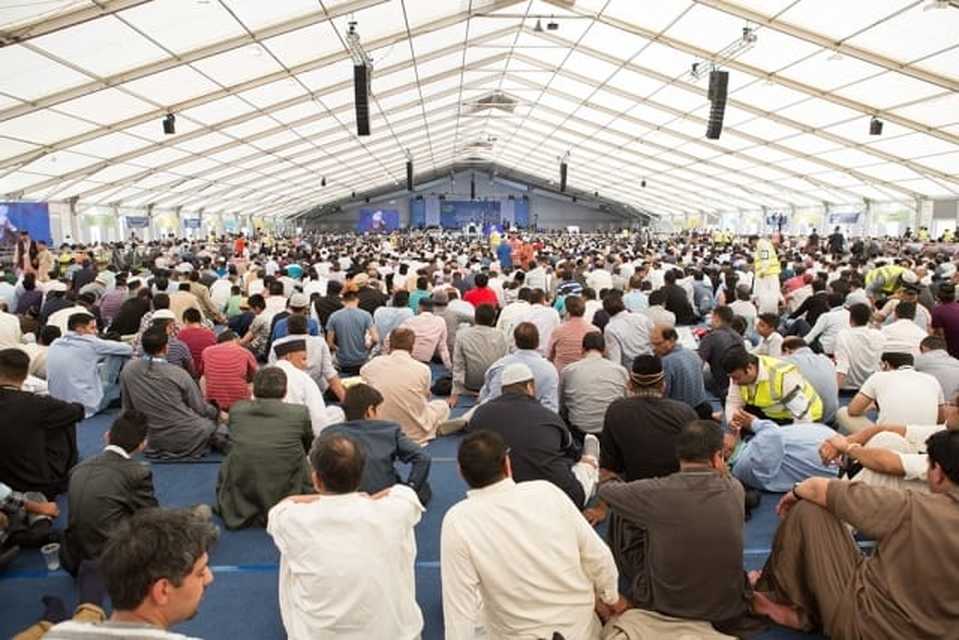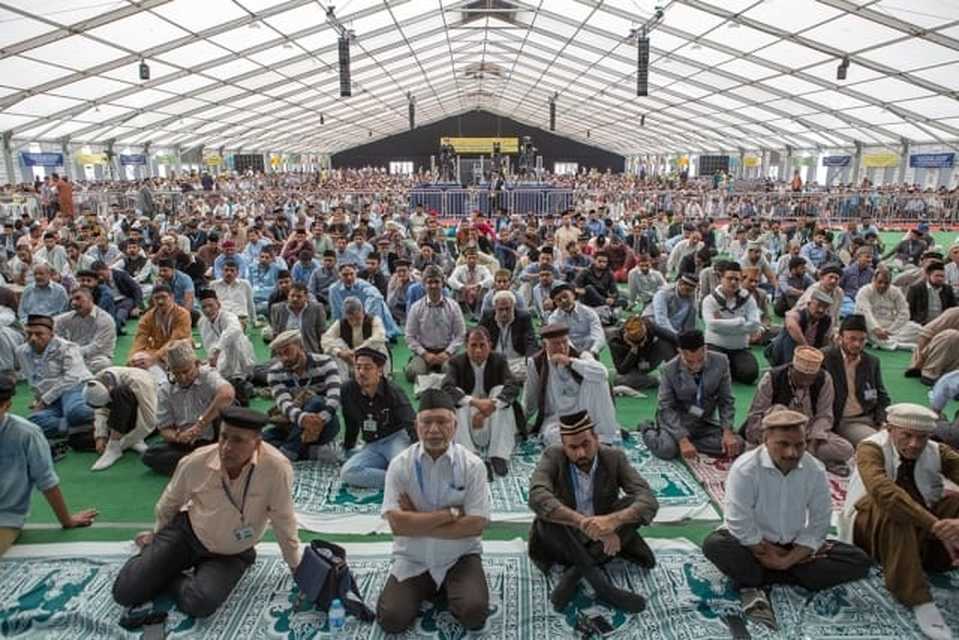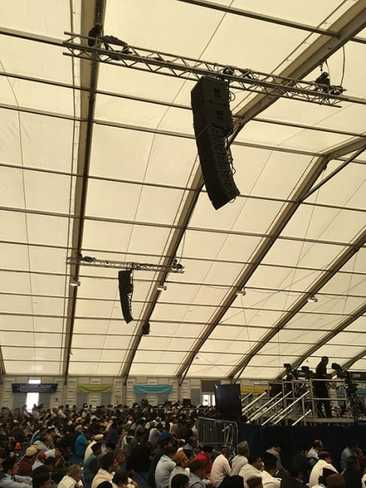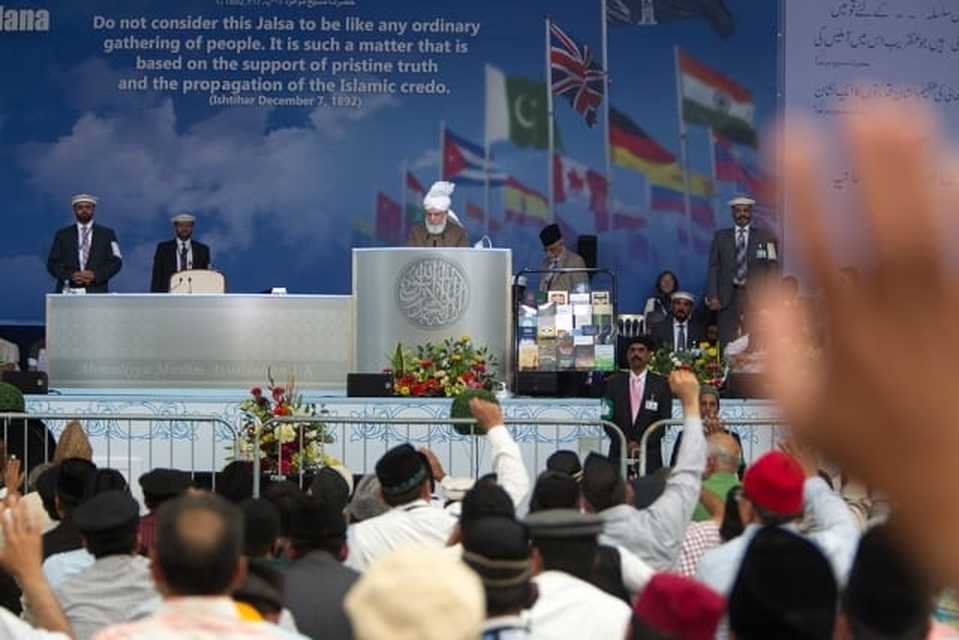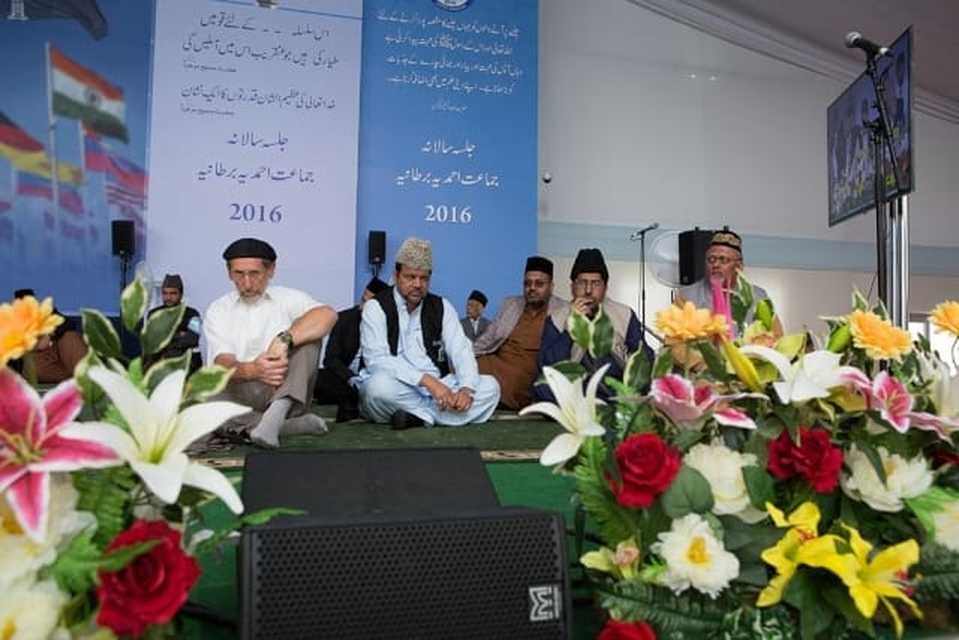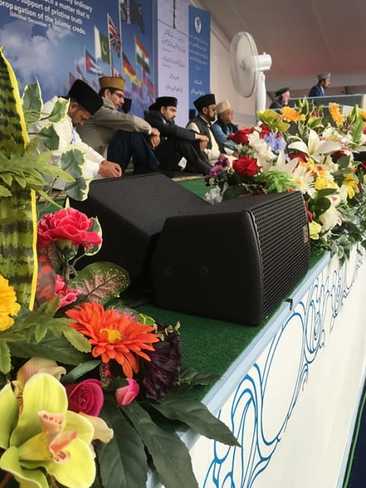50TH ANNIVERSARY OF INTERNATIONAL JALSA SALANA - BY SIMON HONYWILL
By Simon Honywill
Many of us audio types spend the unpredictable English summer in fields making loud things louder. Many are arguably fortunate enough to spend those days in tents in fields making loud things louder, avoiding getting really wet (more, just uncomfortably damp). I would wager however that very few of us find ourselves in a field, in a tent that has been designated a mosque.
For more than one hundred years the Ahmadiyya Muslim community has been leading a peaceful revival of Islam. From the time it was founded in India in 1889 it has enjoyed an unrivalled record for peace and for its efforts to build cohesive societies. Established in the UK since 1913, they built London's first mosque in 1926 (Putney) and now have more than a hundred branches across Britain, opening a number of mosques including the landmark Baitul Futuh mosque in south London and most recently, the Baitul Ikram Mosque in Leicester.
If you are familiar with South-West London, you may have seen a large mosque, in fact the largest in Western Europe. This is the administrative headquarters of the Ahmadiyya Muslim Community, a domain (sept) of Islam that has spread throughout the globe its message of 'Love for all, hatred for none'.
The news reports read like a music festival, but Jalsa Salana is a far cry from that. This is a religious convention with guests travelling from as far as Fiji and Ghana (and across all five continents) to attend the three-day event.
This message brings 38,300 people to Alton from across the world every summer where the current spiritual leader, His Holiness Hazrat Mirza Masroor Ahmad (or Huzur) attends all sessions of Jalsa Salana, delivering sermons, speeches and leading prayers. Jalsa is an opportunity for all Ahmadi Muslims to hear him speak live. It is a time for reflection, prayer and debate, an opportunity to share faith and friendship with fellow Ahmadis Muslims from every continent. It is absolutely critical therefore, that every word is heard, in both the men's and women's marquee mosques, and indeed in many other areas over the large site.
The marquee mosques are large by any standards. The men's is 50m by 130m, the ladies' 50m by 100m. They are the largest span structure supplied by DeBoer, the well-known marquee company, and are comprised of 50m aluminium arches, spaced 5m apart, supporting the covering and creating the framework for the sides which are a selection of doors, ventilation panels and solid plastic. Not an ideal environment for high speech intelligibility. With the addition of some 6500m2 of foam underlay, carpet and a huge drape covering the entire back wall of the structure the RT 60 comes down to a manageable 2 seconds. And, of course, the addition of a first class sound system is essential.
At Jalsa Salana, speech intelligibility is everything. There is no music. The only things that are heard are the spoken word, mainly Urdu and English, but also in Japanese, French, Arabic recitations from the Qu'ran and Urdu poems both of which could be perceived as sung acapella to a Western ear. These are beautiful to experience.
To the Sami Basri (audio visual) team, headed by the National Secretary Audio Visuals UK Safdar Ali and Deputy National Secretary Imran Ali, the quest for perfection in coverage and intelligibility is their calling. All community members are encouraged to make their contribution in whatever way they are able, whether doctors, architects, electricians or cooks, and Safdar Ali and Imran Ali have appropriate backgrounds to enable them to understand the world of sound and video, all of which play a crucial part in the daily proceedings of life as an Ahmadi Muslim. At Jalsa, nothing is more important than hearing the spoken word, both within and outside the marquees. RG Jones Sound Engineering have now been supplying Jalsa for ten years, and every year we work with Safdar and Imran Ali to get closer to audio perfection, tweak the design and improve in whatever way possible.
The biggest challenge with the audio for Jalsa is also the one key thing in the whole event – the voice of the Khalifa (Huzur), A very humble and quiet, gentle man, who speech requires powerful projection.
This year saw a major redesign in the men's marquee with the loudspeaker system being entirely Martin Audio, made up of MLA Mini, DD12 and DD6 components. With proven success of the recent years, we retained the previous design of 4 centrally hung W8LM/LMD arrays with L'Acoustics 12XT outfills, but the men's system was designed to give greater control, better coverage and a much higher gain-before-feedback threshold. The wonders of MLA Mini enabled five individual arrays to be separately optimized for the best coverage with the main central, 12-deep array hung 5m in front of the stage optimized for rejection behind the array, as well as throwing way out to 60m down the structure. This central array also gives a great reference for the rest of the system to be delayed to, ensuring excellent speech intelligibility right down the 130m marquee. Martin Audio's incredible DD12's filled out the edges to maintain coverage right to the sides, and the entire system was run through VU-NET proprietary control software. Stage lip fills and stage foldback were all Martin Audio's DD6 small format, horn-loaded little gem, controlled via Merlins on the VU-NET network.
The results were significantly better than in previous years. Helped by the addition of a DPA 4080 super-cardioid lapel mic on a high-powered Shure radio system, Huzur's gentle words were heard clearer and louder than ever, and the simple control afforded by the VU-NET software meant that the rear part of the marquee could be easily turned up when required. The four MLA Mini delays were also able to be re-optimised during the proceedings to control slap-back and colouration, a valuable and highly desirable asset in the fight for gain.
Four Yamaha QL series consoles were connected together via Dante to ensure simple, flexible signal distribution and negate the need to run long lengths of analogue multicore all around the place like squid-ink spaghetti.
For the RG Jones crew, Jalsa Salana is a step outside the normal – working all day with no shoes on, not being able to enter the women's marquee to listen to the system, incredible food every day, getting up at 3am to engineer prayers all contributes to making ten days in Alton feel more like a journey than a job. It requires a depth of understanding and patience and you are made to feel like a part of the community, being invited to the VIP lunch marquee on show days, visiting the bazaar in the evenings, listening attentively to the speeches and being welcomed by the same faces year on year, even those who have travelled across the world to be there. It is a challenge, make no mistake; just as all our events on this scale have their obstacles and glitches to overcome, but it is also highly rewarding, a great opportunity to learn about this world first hand. Islam is the bad guy in many people's eyes, but a visit to Jalsa Salana is an education in the promotion of peace and understanding across faiths, across nations, and to come away from a week at Jalsa is to be wiser, more humane, and realise that the world of Islam is not what the media might have us believe. That, I believe is something worth praying for.
